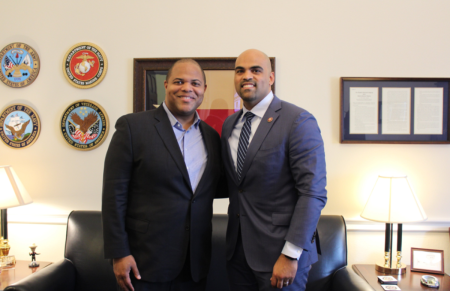Dallas mayor says Christian faith played role in decision to switch party affiliation

Dallas Mayor Eric Johnson cited his Christian faith as one of the reasons behind his decision to switch his party affiliation from Democrat to Republican.
Johnson, who leads the ninth-largest city in the United States and the third-largest city in Texas, was a guest on last Monday’s edition of the “Verdict with Ted Cruz” podcast. He discussed the factors that motivated him to switch parties after winning reelection as Dallas mayor with more than 90% of the vote.
Johnson, an African American, described his decision as an “evolution” resulting from “coming to accept who I have always been and why I’ve struggled as a Democrat the whole time.” He described his transition as a “manifestation of problems I had been having with the Democratic Party because of who I am as a person for a long time.”
“I was raised in a … family that was very, very faith-oriented,” he explained. “The church was hugely important to us.”
Johnson recalled how, as a child, he “spent more time in church than really any place else.”
He added, “We’d go to church Sunday morning, stay almost all day, go home for just a couple of hours and come back for Sunday evening. We’d go to Bible class on Wednesday.”
While he acknowledged that he did not participate in the choir because he “couldn’t sing,” Johnson identified “song practice” as another staple of his childhood. Reiterating how he “spent a lot of time in the church,” he said he also spent “a lot of time with grandparents who were very, very, very about the Church of Christ” that he was raised in.
“My family wasn’t political at all,” Johnson added. He credited his family with instilling in him “a strong sense of just right, wrong” and teaching him “this is how you treat people,” “this is how you behave” and “you follow the law.”
Reflecting on the values his family taught him, Johnson remarked, “I think I was always politically in a weird posture with the Democratic Party.” He suggested that “you sort of inherit the Democratic Party as a cultural heirloom when you’re African American in this country.”
“It sort of gets handed to you as part of who you are,” he said. “I know I had … more phone calls with people distraught about this party switch than I ever would have gotten if I had told people that I was actually leaving the church.”
He characterized the disturbance with his “fit” with the Democratic Party as “inevitable” because of its “belief that how things turn out for you in this country are largely determined by things that are outside of your control” such as “the race you’re born, the neighborhood you’re born in.” Johnson condemned this philosophy as an excusal of “failures” and “successes” to “something that’s out of your control.”
“If you’re successful and you’re white male, it’s because of course you are,” he maintained. On the other hand, “if you’re unsuccessful as an African American, it’s, well, the deck was stacked against you.”
Johnson identified this philosophy as not “how I was raised” and “not how I was taught.” He stated that, on the contrary, “If I put the work in, I was told repeatedly over and over by people who didn’t look like me, who didn’t come from my community, ‘We’re proud of you and we’d like to give you more opportunity.’”
“The story of my life and then the rhetoric my party wanted me to put out there as the justification for what we were doing politically just never really matched,” he concluded.
Johnson announced his decision to switch parties in a Wall Street Journal op-ed published in September 2023. His move made Dallas the largest city in the U.S. to be led by a Republican.
Ryan Foley is a reporter for The Christian Post. He can be reached at: ryan.foley@christianpost.com





















